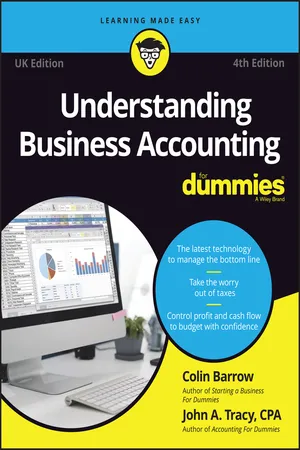
- English
- ePUB (mobile friendly)
- Available on iOS & Android
Understanding Business Accounting For Dummies - UK
About This Book
The easy way to get your head around company finance
Having an understanding of your company's finances is crucial for both small business owners and corporate managers with budget responsibilities. Understanding Business Accounting For Dummies simplifies the key elements of UK business accounting, covering everything from evaluating profit margins to writing financial reports.
Fully updated to cover the emergence of IFRS and dealing with foreign exchange, this new edition thoroughly outlines the essentials of business accounting. With comprehensive guidance and helpful strategies, this book makes light work of the financial fundamentals you need to move up the corporate ladder
- Use the latest technology to manage the bottom line
- Control profit and cash flow
- Budget with confidence
- Make sense of financial statements
- Survive an audit
If you're ready to balance your budget, boost your profit margin and enhance your career profile, this hands-on guide has everything you need to get started.
Frequently asked questions
Information
Accounting Basics
Introducing Accounting to Non-Accountants






- Accountants carry out vital back-office operating functions that keep the business running smoothly and effectively including payroll, cash receipts and cash payments, purchases and stock, and property records.
- Accountants prepare tax returns, including VAT (value-added tax) returns for the business, as well as payroll. They also file reports at Companies House, which stores all the information companies are legally required to supply. And here’s the good bit – Companies House makes that information available for anyone to view (see
www.gov.uk/government/organisations/companies-house). - Accountants determine how to measure and record the costs of products and how to allocate shared costs among different departments and other organisational units of the business.
- Accountants are the professional profit scorekeepers of the business world, meaning that they are the ones who determine exactly how much profit was earned, or just how much loss the business suffered, during the period. Accountants prepare reports for business managers, keeping them informed about costs and expenses, how sales are going, whether the cash balance is adequate and what the stock situation is.
- Accountants prepare financial statements that help the owners and shareholders of a business understand where the business stands financially. Shareholders wouldn’t invest in a business without a clear understanding of the financial health of the business, which regular financial reports (sometimes just called the financials) provide.
Accounting Everywhere You Look
- Accounting for organisations and accounting for individuals
- Accounting for profit-motivated businesses and accounting for non-profit organisations (such as hospitals, housing associations, churches, schools and colleges)
- Income tax accounting while you’re living and estate tax accounting after you die
- Accounting for businesses and professional firms that sell services rather than products, such as the entertainment, transportation and healthcare industries
- Past-historical-based accounting and future-forecast-oriented accounting (that is, budgeting and financial planning)
- Accounting that adheres to cost (most businesses) and accounting that records changes in market value (investment funds, for example)
- Accounting in the private sector of the economy and accounting in the public (government) sector
The Basic Elements of Accounting
Financial statements
Table of contents
- Cover
- Title Page
- Table of Contents
- Introduction
- Part 1: Accounting Basics
- Part 2: Getting a Grip on Financial Statements
- Part 3: Accounting in Managing a Business
- Part 4: Financial Reports in the Outside World
- Part 5: The Part of Tens
- Appendix: Glossary: Slashing through the Accounting Jargon Jungle
- About the Authors
- Advertisement Page
- Connect with Dummies
- End User License Agreement
